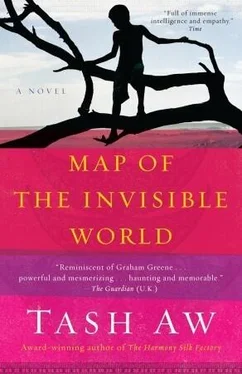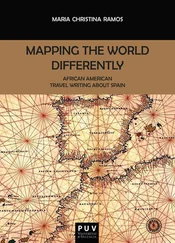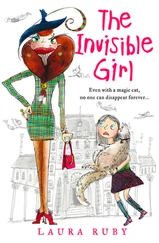Tash Aw - Map of the Invisible World
Здесь есть возможность читать онлайн «Tash Aw - Map of the Invisible World» — ознакомительный отрывок электронной книги совершенно бесплатно, а после прочтения отрывка купить полную версию. В некоторых случаях можно слушать аудио, скачать через торрент в формате fb2 и присутствует краткое содержание. Год выпуска: 2010, Издательство: Spiegel & Grau, Жанр: Современная проза, на английском языке. Описание произведения, (предисловие) а так же отзывы посетителей доступны на портале библиотеки ЛибКат.
- Название:Map of the Invisible World
- Автор:
- Издательство:Spiegel & Grau
- Жанр:
- Год:2010
- ISBN:нет данных
- Рейтинг книги:4 / 5. Голосов: 1
-
Избранное:Добавить в избранное
- Отзывы:
-
Ваша оценка:
- 80
- 1
- 2
- 3
- 4
- 5
Map of the Invisible World: краткое содержание, описание и аннотация
Предлагаем к чтению аннотацию, описание, краткое содержание или предисловие (зависит от того, что написал сам автор книги «Map of the Invisible World»). Если вы не нашли необходимую информацию о книге — напишите в комментариях, мы постараемся отыскать её.
comes an enthralling novel that evokes an exotic yet turbulent place and time—1960s Indonesia during President Sukarno’s drive to purge the country of its colonial past. A page-turning story,
follows the journeys of two brothers and an American woman who are indelibly marked by the past — and swept up in the tides of history.
Map of the Invisible World — читать онлайн ознакомительный отрывок
Ниже представлен текст книги, разбитый по страницам. Система сохранения места последней прочитанной страницы, позволяет с удобством читать онлайн бесплатно книгу «Map of the Invisible World», без необходимости каждый раз заново искать на чём Вы остановились. Поставьте закладку, и сможете в любой момент перейти на страницу, на которой закончили чтение.
Интервал:
Закладка:
“Um, I’m not sure,” Adam said at last. It was hot; not the brilliant heat of the islands, tinged with the smell of sea winds under swirling skies, but a kind of dead, lumpen mass of stickiness that clung to every bit of his skin; he could even feel it on his eyelids. The scant shade of the becak offered little protection against this assault and there was not a breath of wind. Adam felt he was being slowly suffocated. He blinked several times. His eyes felt ill-equipped to deal with the city; it was very different from the one he had imagined. A dog trotted past, and Adam saw that it had something embedded in its hindquarters, a bit of shrapnel; the flesh and skin had grown back over it, covering it with a lump of tissue so that only the tip of it poked out.
On top of all this, Din talked endlessly, his arms flailing to emphasize words, becoming more and more agitated, his voice growing hoarse as it competed with the noise of the traffic. He had been in an irritable mood ever since he’d turned up at Margaret’s house earlier that morning and announced that she had asked him to look after Adam. He seemed glad to find Adam alone.
“But aren’t we better off staying here?” Adam protested. He felt uneasy at the thought of leaving the snug safety of the house. He had quickly developed quite an attachment to it — its contents seemed oddly familiar to him, and he did not want to leave. “Margaret left a note saying not to leave.”
“You can’t stay in all day, can you? Don’t you want to see a bit of Jakarta? Come on, let’s go and discover things. I’ll be your tour guide. Don’t you trust a fellow Sumatran?”
Adam remembered how Din had been generous in his advice the previous day; he meant well, thought Adam, feeling childish and immature at being afraid to venture out with his new guardian. They would simply go out for the day and Margaret would not even have to know about it.
Din’s monologue had begun placidly enough — something about the difference in culture between Perdo and Jakarta, about uniting everyone in Indonesia because it was such a big country. By the time they flagged down a becak he was in full flow. Nothing escaped his wrath; he had a lecture prepared for everything: why the streets were so dirty (low self-esteem, bad education); why we had low self-esteem and bad education (the Dutch, corrupt politics); why we had corrupt politics (poverty, America, the Dutch, ignorance of history); why we ignored our own history (poverty, America, the Dutch, corrupt politics).
“You are a classic example of a badly educated orphan,” Din said. “It’s not your fault. You were abandoned and left to fend for yourself without any understanding of the world around you.”
“That’s not true,” Adam said. “I am educated. My father taught me everything — literature, music, even politics.”
Din curled his hand into a fist and punched his own forehead, hard enough to make a dull, thudding noise. He closed his eyes, and Adam thought maybe he had hurt himself. “A self-deluding orphan, I see. Right, tell me all about the conference that took place in ’fifty-five, right here in Indonesia. Don’t know? I’ll give you a clue. It happened in Bandung. No? I’ll tell you: the Conference of Newly Independent Asian and African Countries, hosted by the president. The start of the new world order, which we control. What about the Nonaligned Movement. No? Do you see what I mean?”
Adam did not quite see what Din meant, and it frustrated him that he could not fully grasp what Din was talking about. It also disturbed him that Din had all this knowledge that he himself lacked. Part of him did not believe that it was all true. He thought he knew about Bandung. It was an elegant city in the hills where the air was cool, a place people fled to, hoping to escape the heat of Jakarta and stroll along elegant boulevards lined with noble, old buildings. He decided he would not say any of this to Din. Compared to what Din knew, all his learning suddenly felt insubstantial and flimsy — a child’s view of the world. The years of learning from and listening to Karl had not amounted to anything. He felt like an infant in the glare of Din’s brilliance.
“You see the world through a European’s eyes,” Din continued before Adam had a chance to respond. “Your own eyes do not work. You can’t see how the world is changing around you. That little country just to the north of here, our neighbor — what’s that called?”
Adam knew the answer. He had come across it in the papers and on the radio. “Malaysia,” he said, trying to sound casual, not too pleased with himself.
“You see? How predictable.”
“But it’s there,” Adam said, pointing ahead of him, as if Kuala Lumpur lay just beyond the horizon. “It exists, doesn’t it?”
“No! That is the point — Malaysia does not exist!” Din shouted suddenly, his head jerking. “Malaysia”—he pronounced it as if speaking a foreign language, his voice squeaky, like a child’s, and Adam remembered the children’s voices at school, mocking his surname: De Willigen? De Willigen? and he remembered the hurt and the shame he’d felt, the shame for something that was not his fault—“Ma -lay- sia is a British construct! It is a work of pure fiction, created by the old Imperialist countries to destabilize Indonesia and all the newly independent countries of the world. It was created so that Britain and America and their cronies can continue to have a presence in this region, but I tell you, their time is finished, finished! We will invade them and crush them, all those Malaysian puppets. They look like us and even speak our language — but they do not know they are being used. This is why we beat them in the Thomas Cup: They are not masters of their own destiny. We are.”
Din fell silent for a moment, his chest heaving with an exhausted satisfaction. In that instant the roar of the Jakarta traffic took over, seizing the initiative from Din’s monologue to fill Adam’s ears with its own rhythms. And yet Adam knew that Din would not, indeed could not, stay silent for long. “My brother,” he said, “is in Malaysia.”
“What?” Din said, turning to look at him. “I thought you didn’t know where he was.”
Adam shrugged. “I don’t know anything for certain.”
“Oh god, this gets worse. Not only do you think like a white person, you have a brother who lives in a neo-Imperialist country. This becak driver must be lame. Why is he so damn slow? The speech will be starting soon. We’re going to listen to it with some of my friends. You’ll learn things. It will be good for you.”
There were about a dozen people in the wood-and-tin shack that stood at the far end of the collection of flimsy structures that formed a courtyard. They were on the edge of a sprawling shantytown bordering Kebon Jeruk, where the houses still seemed solid and at least semipermanent, built more from timber than pieces of rusty corrugated iron: They would at least weather this rainy season, and maybe also the next one. Deeper in this labyrinth, away from tarmac roads and running water, the houses were a patchwork of salvaged scrap: flattened oil drums, biscuit tins, fragments of tarpaulin, splintered lengths of wood, torn mosquito nets — anything that would bring momentary respite from the rain and the sun. But even here, on the fringes of the kampung , Adam had seen a tiny house with walls made from pieces of advertising boards. In front of this house a young woman was fanning a wood fire that refused to light properly. Next to her was a child, a girl, no more than three or four years old, naked except for a dirty ribbon in her hair; she looked up at Adam as he walked past and retreated shyly into the shade of the house. There was no front door, just a gap in the walls that read … kes you ten times stron … mous all over the world, now avai …
Читать дальшеИнтервал:
Закладка:
Похожие книги на «Map of the Invisible World»
Представляем Вашему вниманию похожие книги на «Map of the Invisible World» списком для выбора. Мы отобрали схожую по названию и смыслу литературу в надежде предоставить читателям больше вариантов отыскать новые, интересные, ещё непрочитанные произведения.
Обсуждение, отзывы о книге «Map of the Invisible World» и просто собственные мнения читателей. Оставьте ваши комментарии, напишите, что Вы думаете о произведении, его смысле или главных героях. Укажите что конкретно понравилось, а что нет, и почему Вы так считаете.












